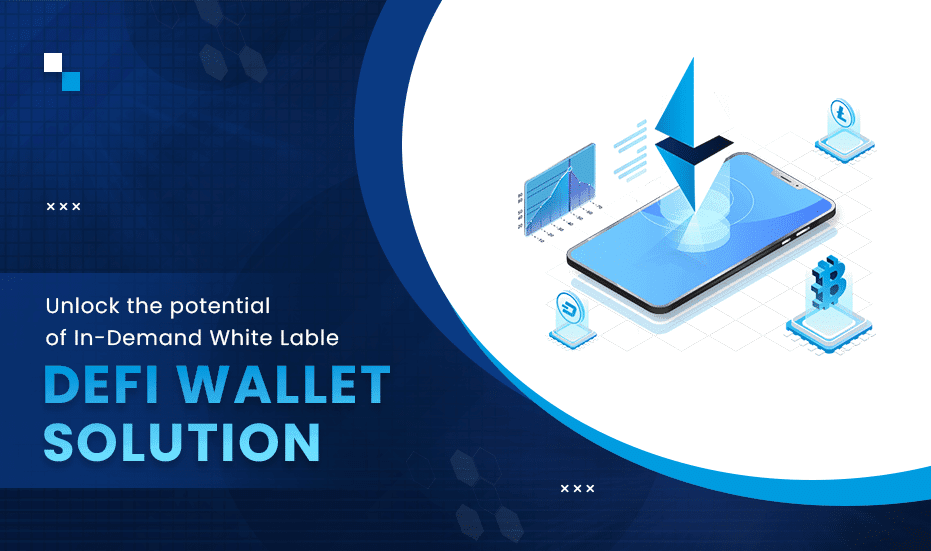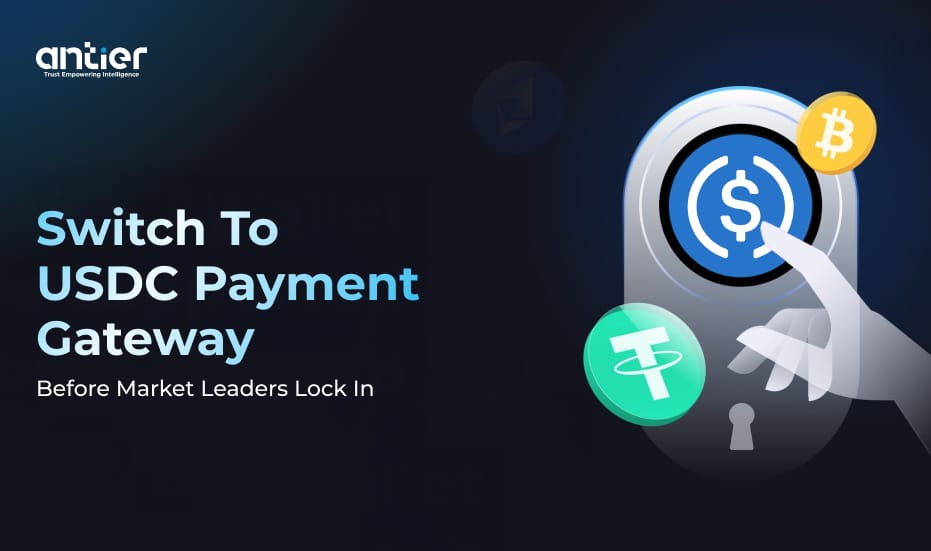Table of Contents
- Introduction
- Why should enterprises opt for a white label DeFi wallet solution
- Explore the Exquisite Features of a White Label DeFi Wallet Solution
- Security Features Integrated in a White-Label DeFi Wallet Solution
- DeFi Wallet Development : A Significant Aspect of DeFi Ecosystem
- Create Your Own DeFi wallet in 5 Steps
- Wrapping words
Introduction
The popularity and demand of DeFi wallets have increased over recent years. It has become one of the dominating segments of the crypto market that allows users to perform transactions without any involvement from the third-parties. The majority of the credit behind the success of this industry goes to White label DeFi wallets. The platform is an open and global alternative to every financial service consumers use, like savings, loans, insurance, and trading. Also, developing a White label DeFi wallet solution has bought remunerative gains to enterprises.
Before we move ahead, it is vital to understand these wallets and how to create an optimum White label DeFi wallet solution.
It is a pre-built ready-to-deploy solution that businesses can launch under their brand name. Thus, it saves their development time and effort of developing a solution from scratch.DeFi Wallets follow the approach of “Be your Own Bank.” It offers transparency and accessibility and gives the fund authority to the users. This is the biggest reason behind the popularity of these wallets.
Why Should Enterprises Opt for a White Label DeFi Wallet Solution?
1. Time Saving
Developing a wallet from the beginning can be time-consuming. This isn’t the case with a White-label DeFi wallet solution, as the basic infrastructure is already in place. It’s just the wallet that needs to be customized according to business requirements.
2. Cost Effective
Developing the wallet from the start can be hefty as it requires a lot of resources. On the contrary, a white-label DeFi wallet has a pre-built infrastructure which lowers the cost and resources needed to develop a wallet.
3. Customization
The most significant advantage of investing in a DeFi wallet is the customization. Businesses can integrate the features and functionalities of the wallet per their requirements.
4. Security
White label DeFi wallet solution prioritizes wallet security at all costs. This feature is important as it helps enterprises build trust and protects the wallet from hacks and breaches.
5. Scalability
As the market flourishes, businesses must opt for a solution that is scalable. The white-label solution has the required infrastructure to handle the increasing user base.
Explore the Exquisite Features of a White Label DeFi Wallet Solution
- Custom Branding
Custom branding is one of the significant features of a White label DeFi wallet solution. Businesses can integrate branding elements like logos, color schemes and add other features to the user interface. This determines their consistency and gives them a competitive edge over others.
- Multicurrency Support
The wallets offer multicurrency support, thereby allowing users to manage assets using a single wallet.
- Two-Factor Authentication
To protect the contents two-factor authentication feature is integrated into the wallets. All you need to do is enter the password along with a one-time code to access it.
- Multi-Device Support
The wallet offers multi-device support and can be accessed via any device.
- Transaction History
Using the transaction history feature provides detailed information about the transactions to the users.
- Integration with other Services
The wallets can be integrated with exchanges, payment gateways, or any other third-party applications and offer a next-level wallet experience to the users.
- Customer Support
At times, users might face issues while accessing the wallets, which they can discuss over email, phone, or chat.
Security Features Integrated in a White-Label DeFi Wallet Solution
Security is critical to a white-label crypto wallet. These wallets comprise high-graded security protocols that protect the assets of the users. Security features that are added to the white-label DeFi wallet solution are:
- Multi-Layer Security
White-label solutions are integrated with multiple layers of security like multi-factor authentication, encryption, and anti-phishing measures that make the wallet impossible to hack.
- Cold Storage
Cold storage keeps the wallet’s private keys offline, thereby preventing it from unauthorized access. This security measure is often integrated into the White label wallet solution to protect user assets.
- Secure backup and recovery
Secure backup and recovery practices have been implemented in the wallet to protect the user assets in case of lost or stolen devices or unforeseeable situations.
- Hardware wallet integration
These wallets can be connected with hardware devices that keep the wallet keys in an offline mode. These wallets provide extra security and protection against hacking attempts.
- Regular Security Updates
The wallets provide updates from time to time to prevent vulnerabilities in any form.
- Auditing and Compliance
The wallet undergoes auditing and checks from time to time to meet security and regulatory standards.
By integrating security protocols, the wallet development experts ensure that a secure and trusted solution is delivered to businesses.
DeFi Wallet Development: A Significant Aspect of DeFi Ecosystem
1. DeFi systems are incomplete without white label DeFi wallet solution.
2. In the past the centralized systems were entirely dependent on 3rd parties to obtain financial services which isn’t the case with DeFi as they are free from intermediaries and integrated with security protocols that protects them from hacks and breaches.
3. The solutions are developed on Ethereum blockchain and keeps the users identity anonymous.
4. DeFi wallets are a safe option and gives maximum returns to business harnessing the capabilities of DeFi wallet development.
Create Your Own DeFi wallet in 6 Steps :-
Create your DeFi wallet by following the five steps mentioned below:
#Step 1: Research & Choose a White Label DeFi Wallet Provider
Among several wallet providers, make sure you associate with the right one after intensive research. They will tailor the solution as per your business needs.
#Step 2: Wallet Customization
Once you have chosen the provider, you can customize the wallet by integrating them with brand elements like logo, color scheme, and other design features. You can even decide things like features and functionalities you wish to include in the wallet.
#Step 3: Wallet Integration with the platform
Once the wallet has been customized, the next step is to integrate it with the platform. You can achieve this by adding a wallet as a feature in the platform and installing necessary API connections.
#Step 4: Testing
After integrating the wallet with the platform, test the wallet thoroughly to ensure that it runs smoothly and fulfill the requirements of the end users.
#Step 5: Launch
Once the glitches and bugs have been eliminated during the testing phase, it’s time to launch the wallet and help users explore it. Make sure that the wallet instructions are clearly mentioned along with the support services offered by you.
#Step 6: Post Deployment
White label DeFi wallet solution requires maintenance and updation from time to time. Make sure that post-deployment support is rendered to help it run smoothly.
Wrapping Words
Trust Antier develops robust and scalable White label DeFi wallet solution for global enterprises. Our DeFi developers develop feature-rich wallets to enhance the user experience, like built-in cryptocurrency exchange features, support for DeFi protocols, and advanced security features. We have a team of more than 700 blockchain developers and have delivered 250+ wallet solutions. Kickstart your wallet development journey by discussing your requirements with our subject matter experts today!







